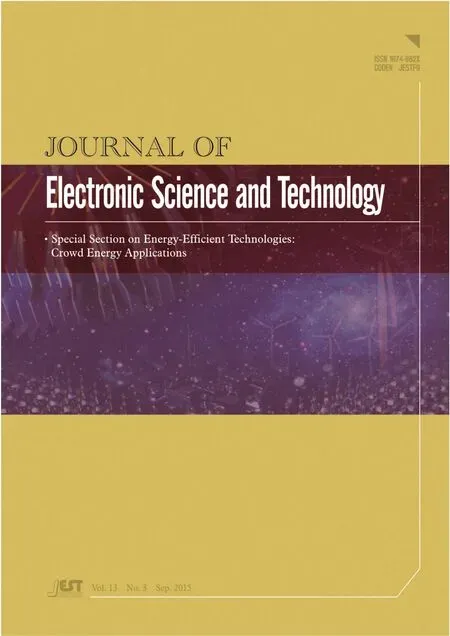Special Section on Energy-Efficient Technologies: Crowd Energy Applications
Stephanie Teufel
Guest Editorial
Special Section on Energy-Efficient Technologies: Crowd Energy Applications
Stephanie Teufel
It is no secret—the world as it is today only runs with energy; and it is also no secret that the world is faced with steadily increasing energy demands. The reduction of dependence on fossil fuels is a global goal. To achieve this goal three paths have to be considered: First, the substitution of fossil fuels with renewable energy; secondly, the increase in energy efficiency and the expansion of opportunities for energy storage; and thirdly, to find solutions to the associated socio-economic challenges.1
With a focus on CO2reduction and the pursuit of renewable energy, the energy systems will decentralize tremendously. Technological developments, such as those in the fields of photovoltaic, sensors, and energy storage, allow an extensive local generation of energy as well as an intelligent and sustainable usage of energy. Efficiency and decentralization with a tendency to energy self-sufficiency have been the effects. This leads to concepts, such as the Crowd Energy, and raises the questions of what are the cutting-edge services and applications as well as what are the economic, political, and social-innovative structures needed to support the energy consumer as he becomes an energy prosumer. So, future energy systems are not just a topic of innovative technologies, but also of innovations in economic, political, and sociological sectors.
For presenting the latest research achievement or applications on these issues, we launch this Special Section on Energy Efficient Technologies: Crowd Energy Applications.
For this Special Section, eight papers were accepted by a very cautious review of highly qualified submissions. These cover the areas of crowd energy management; microscale trigeneration systems and their role in the crowd energy concept; enterprise architecture for sustainable energy system development; analysis of stakeholder engagement; sentiment analysis applied to the electricity market; influence of taxation on supply and demand; enhancement of distributed generation; environmental impact of ICT operating systems.
The section starts with the paper Crowd Energy Management: The New Paradigm for the Electricity Market. It is argued that the traditionally centralized approach of electricity networks progressively has been undergoing a shift towards a decentralized, distributed structure. Thus, the local and crowd-based principle is transforming the existing supply chain and related activities into a value network (VN). Collaboration with and within crowds particularly demands a different mindset and management of sharing values, information, benefit, and risks. The contribution proposes a holistic framework of electricity VN management for crowd energy.
The second paper, Multiperspective Analysis of Microscale Trigeneration Systems and Their Role in the Crowd Energy Concept, depicts the transformation of the current energy system into a decentralized intelligent one. Innovative technologies and ideas are the fundamentals for a successful transformation, e.g. the combined cooling, heating and power systems (CCHP or trigeneration system). The obstacles of a CCHP deployment are discussed and a theoretical analysis of the energy-economic dimension is given, thus, itemizing its potential regarding the crowd energy concept in terms of the technical flexibility of a power system.
The third paper, Rethinking Enterprise Architecture for Sustainable Energy System Development, reflects the thoughts of an international research team from Lithuania and Australia in terms of a strategic agile enterprise architecture driven approach that could effectively guide the sustainable energy system development.
Smart grid technologies (SGT) have been an important step toward greener and more efficient energy usages. They are an important part to achieve the energy goals all over the world. However, the integration of innovative technologies and concepts requires congruent and coherent actions of all stakeholders. Thus, the fourth paper, Analysis of the Stakeholder Engagement in the Deployment of Renewables and Smart Grid Technologies, proposes and discusses a framework for the interplay of the energy stakeholders and introduces a communication strategy for an active promotion of SGTs.
The fifth paper, Sentiment Analysis as a Source of Gaining Competitive Advantage on the Electricity Market, focuses on the energy market aspect. The authors fromPoland introduce a solution that through the use of quasi real-time and automated sentiment analysis on the energy suppliers and the relevant aspects of their offers may enable energy companies to quickly adapt to changing circumstances, prevent potential customer churn, and harness new business opportunities.
The sixth paper discusses Influence of Taxation on Supply and Demand in Tomorrow’s Crowd Energy Paradigm. The authors highlight a need to revise the policymaker’s long-standing transactional view of taxation and propose a number of original fiscal concepts for policymakers to implement in support of micro-grid development.
Paper seven, Enhancement of Distributed Generation by using Custom Power Device, presents the monitoring, modelling, control, and analysis of two levels, the three phase wind energy based distributed generation system, where the electric grid interfacing the custom power device, is controlled to perform the smart exchanging of electric power.
Finally, paper eight, A Methodology to Measure the Environmental Impact of ICT Operating Systems across Different Device Platforms, discusses an interesting aspect of energy-efficient technology, i.e. the impact of ICT operating systems. A new methodology is introduced to measure and describe an operating system’s impact on device energy consumption and related environmental impact, regardless of its device type or platform.
The contributions have shown that technology is necessary; but technology for the allocation of regenerative power and energy efficiency is not a progressive notion in the future of energy systems, but the associated change in the roles of all stakeholders and their understanding of the convergence of energy sources are indeed progressive shifts. This relates not only to the correlation and interaction of the participants, but also to the way energy is used.
As the guest editor of this special section, I would like to express my sincere thanks to the authors from Australia, Germany, India, Lithuania, Poland, Switzerland, and the UK for their contributions to this special section. I would like to express my honest thanks to all reviewers and supporters. Finally, I should, also on behalf of the authors, express my gratitude to the editorial team for their efforts and their everlasting support throughout the process.
Stephanie Teufel
July 2015

Stephanie Teufelstudied informatics at the Technical University of Berlin and the Swiss Federal Institute of Technology Zurich (ETH Zurich). She received her Doctor’s degree from the University of Zurich in 1991. She was a lecturer at the University of Wollongong, Australia, and a university professor in information systems at the Carl von Ossietzky Universit?t Oldenburg, Germany. Since 2000 she holds a full professorship in management in information and communication technology at the Faculty of Economics and Social Sciences, University of Fribourg, Switzerland. Furthermore, she is the Director of the International Institute of Management in Technology (iimt). Currently, she is the Dean of the Faculty of Economics and Social Sciences, University of Fribourg, Switzerland. Her research interests include management of information security, energy systems management, project management, innovation, and technology management.
Digital Object Identifier: 10.11989/JEST.1674-862X.507291
 Journal of Electronic Science and Technology2015年3期
Journal of Electronic Science and Technology2015年3期
- Journal of Electronic Science and Technology的其它文章
- Energy Management Strategies for Modern Electric Vehicles Using MATLAB/Simulink
- Hybrid Aging Delay Model Considering the PBTI and TDDB
- Time-Efficient Identification Method for Aging Critical Gates Considering Topological Connection
- Residual Phase Noise and Time Jitters of Single-Chip Digital Frequency Dividers
- A Methodology to Measure the Environmental Impact of ICT Operating Systems across Different Device Platforms
- Enhancement of Distributed Generation by Using Custom Power Device
